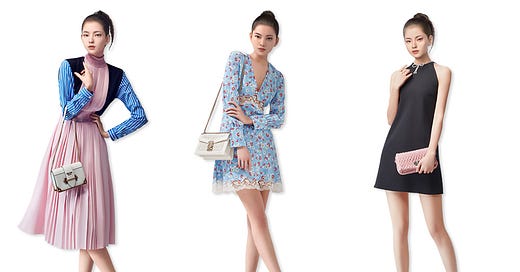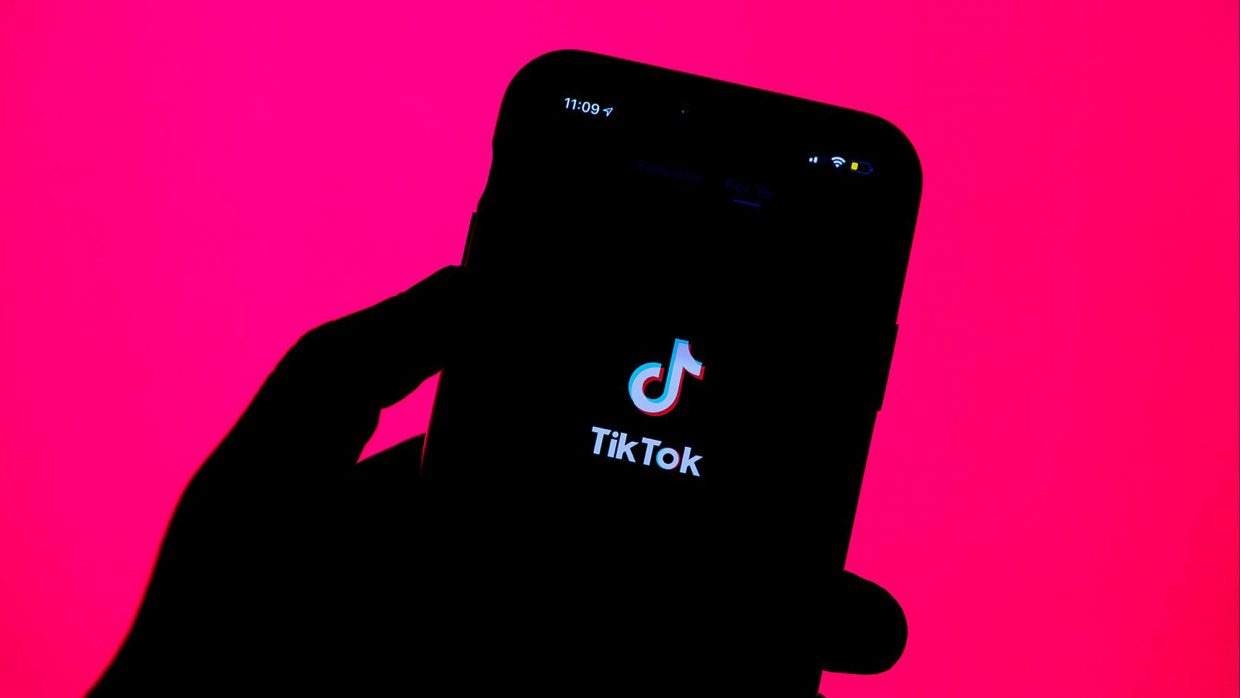Future Tech China: Three Predictions for 2021
Plus: The coat brand that won Singles' Day, a wine opportunity for Europe, and the ways TikTok is shaping consumer behavior.
The Content Commerce Insider newsletter highlights how brands create content to drive revenue. If you have received our newsletter from a friend or colleague, we hope you will subscribe as well and follow us on LinkedIn and Instagram.
2020 is coming to a screeching halt. Let's hope that 2021 will be better, and with that in mind, here are three Chinese tech predictions for the year ahead.
1. China Wakes Up to E-commerce Subscriptions
Call China a tech laggard and you're generally wrong — except when it comes to e-commerce subscriptions. In 2021, Alibaba will finally come to its senses and start building out a subscription feature for its grocery business, Freshippo. Bonus points (for me) if it rolls out on B2C platform Tmall, or perhaps it will even go the full monty across all retail channels, including C2C Taobao. On Amazon, this is called "Subscribe & Save,” which encourages consumers to choose auto-deliveries (typically monthly) of their favorite products for a discount of 15%.
2. At Least One Major Brand Announces Its Own Virtual Influencer
Virtual influencers are a big thing. If iQiyi's “Dimension Nova” (跨次元新星) competition show or League of Legend's K/DA don't convince you otherwise, 2021 probably will. Influencer costs are rising and China's Gen Z is keen enough on the universe of ACG (Anime, Comics and Games) and virtual stars such as Luo Tianyi that the timing is right.
The infrastructure is expanding as well — for every big brand inquiring about virtual influencers, there are two smaller agencies that will be able to offer services. Wieden + Kennedy built a virtual Colonel Sanders for KFC and other agencies will follow suit with similar offerings for their clients.
A parallel trend here is that of digital doubles such as Amazon Music's digital Justin Bieber or Travis Scott's Fortnite appearance. Alibaba has already got a start by creating a virtual version of popular idol and Tmall spokesperson Jackson Yee, and created the virtual model Aimee who has appeared in campaigns for Prada and Miu Miu on Tmall Luxury Pavillion, while Tencent Music just invested in Los Angeles-based Wave to bring more virtual stars to China.
3. Chinese Tech Giants Get Into Hardware
Alibaba, Tencent, Bytedance, Baidu, and Meituan already own most of the digital real estate on any Chinese user's hardware (read: smart phone, smart watch, smart speaker, etc.). But they're increasingly looking at ownership of the full stack. Alibaba started selling its Tmall Genie assistant in 2017 and updated it in 2019. Expect more to come soon.
In 2021, perhaps Bytedance will start making smart glasses (à la Snapchat’s Spectacles) or Tencent will leverage its gaming prowess to develop into AR and VR devices such as headsets.
There are two big and semi-contradictory trends at play here: gaming and graying. Gamers will look for specialized playing hardware, while seniors have different needs and like convenience — as long as it's not targeted at them.
Tangent: the average Apple Watch user is 41 years old, and Apple loves to emphasize the device’s health features (including fall detection). Long story short: Apple knows what it's doing.
- by Tanya Van Gastel
Mentioned in today’s newsletter: A24, Alibaba Pictures, Amazon, Apple, Bilibili, Bosideng, Burberry, Bytedance, Douyin, Freshippo, Jean Paul Gaultier, KFC, Louis Vuitton, Mercedes-Benz, Metropolitan Museum of Art, Miu Miu, NASA, Prada, Tencent, Tesla, TikTok, Wieden + Kennedy.
How Chinese Outerwear Brand Bosideng Won Singles’ Day
by Ginger Ooi
One of the most successful fashion brands in China’s recent Singles’ Day shopping season was domestic outerwear brand Bosideng, which earned the distinction of the top ranking on Tmall for both men’s and women’s clothing this year.
The brand got an early start to its sales on October 20, when Alibaba launched its Singles’ Day presales. Bosideng scored a coup as one of only two apparel brands to be featured among the 120 products shared on top livestreamer Li Jiaqi’s broadcast that evening. Li featured two styles of down coats, spending about 10 minutes describing their features as he and members of his team modeled them, ultimately selling RMB 45 million ($6.7 million) worth of the product.
Throughout the three weeks of promotions leading up to the big day on November 11, Bosideng continued to rely on livestreaming to drive sales, which it reported were up 25% year-on-year for the Singles’ Day period. Total sales this year hit RMB 1.5 billion ($228 million), reaching the RMB 100 million ($15 million) milestone within eight minutes. Those numbers, and Bosideng’s strong presence in livestreaming, led to its selection as one of Taobao Live’s brand participants in its ongoing “Kung Fu Anchors” campaign. Going forward, Bosideng plans to increase its livestreaming presence and add talent to host broadcasts exclusively for the brand.
Bosideng’s livestreaming initiatives also extended to its latest collaboration with French designer Jean Paul Gaultier, which was promoted via an immersive online fashion show that offered viewers a 360-degree runway experience. Other recent brand-building efforts that have raised Bosideng’s profile among Chinese consumers have included film placements such as in 2019’s “The Climbers” (攀登者), product collaborations with the likes of NASA and China’s Antarctica Scientific Expedition, sponsorship of China’s national mountaineering team for Everest ascents, and working with celebrities such as Yang Mi, William Chan, and Kendall Jenner.
As more Chinese look to continue spending more time outdoors in the aftermath of the coronavirus epidemic, Bosideng appears to be successfully fending off competition from global names like Canada Goose and Arc’teryx to become a domestic brand of choice. The Hong Kong-listed company reported that revenues for the Bosideng brand were up nearly 20% year-on-year during the six-month period ending September 30 at RMB 2.73 billion ($416 million), and that was before the Singles’ Day frenzy and peak shopping period for winter wear.
CCI Take: An Australia-China Wine Spat Opens Door for France and Spain
The widening diplomatic and economic rift between China and Australia continues to gain headlines worldwide, with China recently imposing tariffs of up to 200% on imports of Australian wine following the preliminary results of an anti-dumping investigation. The move is expected to cause a significant dent in Australia’s wine industry, which is worth $1.2 billion a year and sees nearly 40% of exports going to China.
But the secondary story going on in the background is a fresh opportunity for global wine producers to leverage content-commerce trends and fill a gap in China that would otherwise be occupied by Australian wine (at least for the next several months), by specifically targeting younger, digitally native Chinese drinkers.
Unlike older generations, young drinkers in China are more willing to learn about and purchase wine and spirits online, and they are more likely to drink alone or in small groups, rather than in the high-pressure social settings of restaurant banquets. Younger consumers who are active on social media are a fast-growing driver of alcohol sales in China, and they are increasingly female.
A recent study by CBNData found that drinkers born in the 1990s are the growth engine for online sales of wine and spirits, with young women accounting for the bulk of these purchases. In the marketing world, this trend has translated into a growing number of beverage brands tailoring their advertising and marketing to tap this valuable demographic.
Read the full article on Content Commerce Insider
How Short-Video Platforms Are Shaping Gen Z Consumer Behavior
Short-video apps have the world’s young consumers hooked with their compelling and easily digestible feeds of fleeting content. Leading the pack in this burgeoning sector are ByteDance platforms Douyin and TikTok, which in a few short years have come to dominate the pop culture conversation as much as the attention of digital natives.
Since launching in 2017, TikTok has amassed more than 1 billion users in over 150 countries, with 90% of its users accessing it daily. China alone is responsible for around 86% of TikTok’s revenue. Gen Z-ers and millennials, those consumers-to-watch, make up a bulk of the apps’ demographic: Parklu estimates that 85% of Douyin users are aged below 24, and the 2019 Global Web Index records that 41% of TikTok users are aged between 16 to 24.
In 2020, Douyin and TikTok have only swelled in popularity as they’ve kept users entertained and scrolling during Covid-related lockdowns. According to SensorTower, they are now the top-grossing apps worldwide. But just as consumers have guaranteed the apps’ successes, Douyin and TikTok have naturally come to shape the tastes and habits of its audience.
Here are three ways in which these platforms provide valuable insight into these new consumer behaviors:
1.) Personalized Marketing Over Blanket Advertising
Blair Zhang, China Analyst at global market research company Mintel, tells Jing Culture & Commerce that apps like Douyin are demonstrating that consumers are more receptive to personalized marketing. “Consumers nowadays need brands to have enthusiasm to be close to them,” says Zhang. “Video content that can better resonate to attract consumers wins more screen time.”
Read the full story on Jing Culture & Commerce
Brand Collaboration Pick: Metropolitan Museum of Art x Game for Peace
The presence of premium brands in gaming has been accelerating rapidly in China as marketers realize the vast potential of the country’s 500 million-plus players. Gaming is a mainstream pastime, and its fans span the consumer spectrum, including women and potential customers for luxury brands such as Louis Vuitton and Burberry and high-end autos from Mercedes-Benz and Tesla — all of which are working in the red-hot sector.
International cultural institutions are also sensing an opportunity to reach audiences for whom travel is not currently possible and engage them with arts appreciation through gaming. In what has been lauded as the first collaboration between a major global art institution and a top Chinese gaming IP, New York’s Metropolitan Museum of Art recently partnered with Game for Peace, Tencent’s Chinese mobile version of PlayersUnknown Battlegrounds, to showcase the iconic Fifth Avenue building and famed works from its collections as part of a limited-time “fantasy journey” mode in the game.
The immersive experience encourages players to get up close and explore the museum’s treasures, enhancing the cultural cachet of a game better known for militaristic fighting (though toned down in the Chinese version).
News From China
It’s that time of the year for looking back at top trends of 2020, and China’s media arbiters have been offering up their picks for words and phrases that took off in what will go down as an unforgettable year of pandemic and recovery.
Last month, the magazine Youth Digest published its top-ten list of 2020’s defining terms, which included nods to the country’s coronavirus experience, such as “cloud construction supervisors” (云监工) and “those who go against the flow” (逆行者, aka frontline workers), as well as references to social trends, such as the “next wave” (后浪) of young Chinese popularized by Bilibili’s controversial video and “people with a balance” (尾款人) for those who make impulse purchases on credit (especially during e-commerce livestreams). “Nunchucks” (双节棍) also appeared, first as a reference to the double-whammy holiday of Mid-Autumn Festival and National Day, which both fell on October 1 this year, and later to describe Alibaba’s two major sales periods that were part of this year’s Singles’ Day shopping season.
This week, Bilibili also released its annual list of its top “bullet chats,” a defining feature of the platform. These user-submitted comments (弹幕, danmu, literally, “bullet screen”) stream across the screen in real-time as videos play. Bilibili reported that, in the third quarter, its nearly 200 million monthly active users averaged more than 5.5 billion interactions per month (including bullet chats), a 117% year-on-year increase.
Appearing more than 5.4 million times, the top bullet chat phrase of 2020 is “grandpa’s youth is back” a reference to the nostalgia experienced when viewing familiar and comforting video content, such as a classic “Harry Potter” movie or footage of Kobe Bryant in action. Product reviews for throwback brands such as Motorola or retro-style make-up tutorials could also prompt a slew of “grandpa’s youth is back” comments.
In the number two spot was “Stay strong, Wuhan!” which appeared frequently to express support for the city at China’s coronavirus epicenter, especially in videos that showed life on the ground and on the front lines.
The viral effect of bullet chats can offer opportunities for brands to tap into cultural trends among young Chinese consumers. For example, some creators may produce videos around the most popular bullet chat memes in order to draw more comments and land a higher position on Bilibili’s rankings. Promotional events and collaborations may offer another path to commercializing popular expressions.
Alibaba Pictures is taking a content-first, distribution-later approach to reaching young audiences with its new film brand, Surprise Works, which will focus on indie-style productions (the New York-based studio A24, known for breakout hits such as “Moonlight” and “The Farewell,” has been cited as a model).
The studio announced the new unit’s slate of 20 upcoming projects to mark its launch, emphasizing current genre obsessions among Gen Z, such as coming-of-age stories, suspense, and science fiction.
According to Jerry Li, head of Alibaba Pictures, Surprise Works’ productions will be distributed through whatever appears to be the most promising channel, whether that’s movie theaters or via streaming on Alibaba’s Youku platform. Li also noted that some 40% of Youku’s 25-and-under audience has not been to a movie theater in the past year, though they watch plenty of movies online. However, to date movies made for online distribution have lagged in quality compared to theatrical releases.
News in English
After Double 11 (aka Singles’ Day) comes Double 12: Alibaba is turning the December sales event into a month-long campaign with participation from more than 9 million merchants on Alipay. Dao Insights
Thanks to a longer promotional period and local government subsidies to encourage consumption, the 618 Shopping Festival beat out Singles’ Day in GMV terms, and four more insights on e-commerce trends in the year that was. KrAsia
Following reports that retailer Suning was considering selling off its e-commerce business, the company announced that it had raised more than $910 million in funding for its newly launched Yunwang Wandian platform. Deal Street Asia
Social media-worthy jackets and hotpot broth are among the top 10 products sought out by female consumers on Pinduoduo this fall, with food and beauty as two main themes. Pandaily
China accounted for just 2.5% of the $60 billion global perfume market in 2019 and younger women account for more than two-thirds of sales, with huge growth opportunities for brands in the sector. Azoya
The digitally native Chinese athleisure brand Maia Active is betting that it can know its target consumers better than global giants such as Lululemon and Nike, and is planning a major offline expansion of more than 100 stores within the next three years. WWD
Meanwhile, the domestic lingerie brand Ubras has leveraged social media, livestreaming, and a unique “one-size-fits-all” approach to underwear to become the top-selling brand in the category on Tmall. China Marketing Insights
Toymaker Pop Mart is banking on the Chinese youth craze for blind boxes to raise around $670 million in its upcoming Hong Kong IPO, well above the previously expected figure in the $200 million to $300 million range. Pandaily
China’s new export law is likely to accelerate a shift in production for global brands to Southeast Asian countries such as Vietnam and Cambodia. Business of Fashion
We’ve Got China Covered
China Film Insider: Sino-European Interactions Take Stage in the Virtual Space
Jing Daily: Dior Learned to Localize in China – and Was Rewarded for It
Jing Culture & Commerce: How to Future-Proof the Museum: What We Learned From the Louvre Abu Dhabi Symposium









